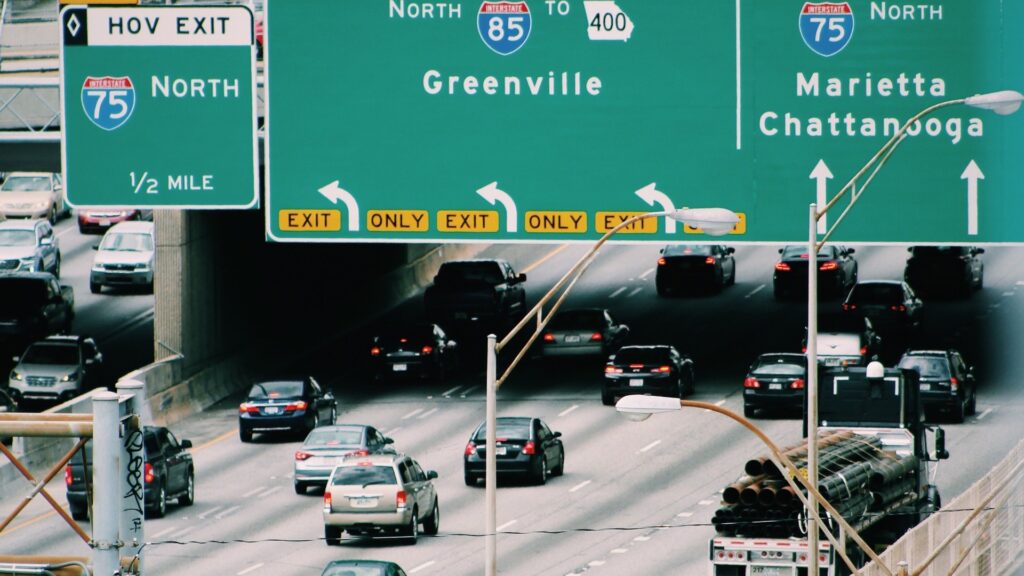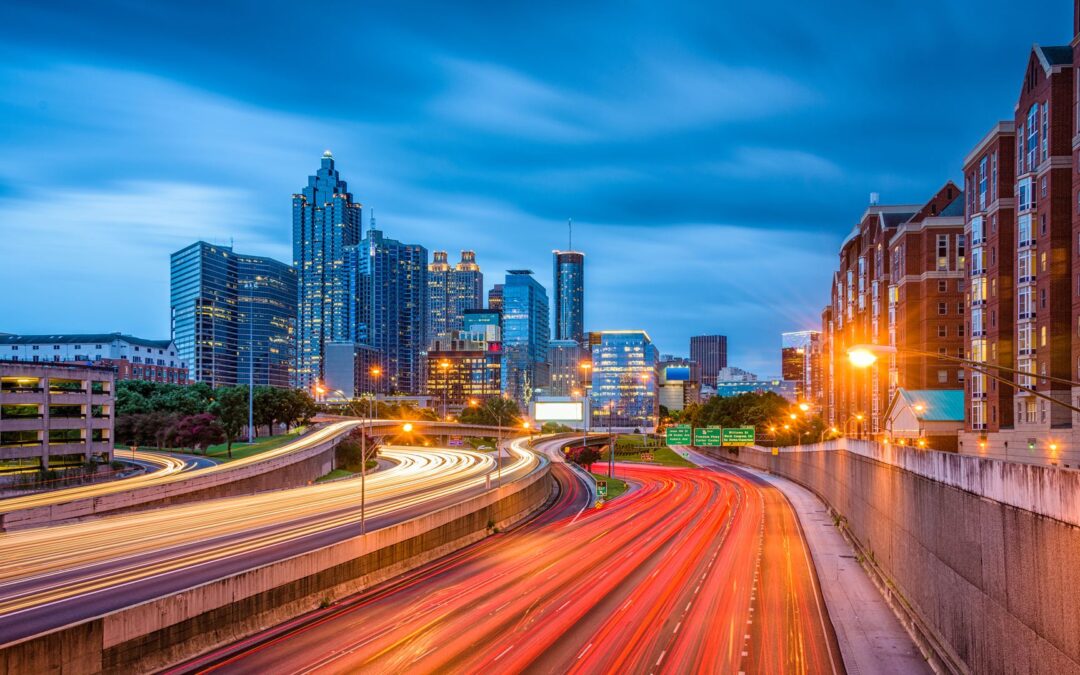Rush hour traffic in Georgia is notorious, especially in major metro areas like Atlanta. With crowded interstates like I-285 and I-75 and arterial roads congested during peak commuting times, accidents are unfortunately common. Knowing how to handle a crash during rush hour can reduce stress, ensure safety, and help protect your legal rights. This blog provides a comprehensive guide on what to do if you’re involved in an accident during rush hour in Georgia, covering legal considerations, safety tips, and practical steps to take.
Understanding the Challenges of Rush Hour in Georgia
Rush hour occurs weekdays, typically between 7:00 AM and 10:30 AM and again from 3:00 PM to 6:30 PM. As we all know in Georgia, these times have been blending, with rush hour starting as early as 1:00pm. During these times:
- Increased Vehicle Density: Thousands of commuters are on the roads, making it harder to maneuver or avoid collisions.
- Driver Fatigue and Frustration: Long hours in traffic can lead to impatience and risky driving behaviors.
- Construction Zones: Georgia frequently has active construction zones, especially on highways, which adds to the danger.
- Unpredictable Weather: From summer thunderstorms to icy winter mornings, Georgia’s weather can complicate driving conditions.
Understanding these risks can help you stay alert and prepare to handle accidents effectively.
Immediate Steps to Take After an Accident
- Prioritize Safety
- Move Vehicles (If Possible): Georgia law allows drivers to move their vehicles out of traffic lanes after an accident if it is safe to do so. This reduces the risk of secondary accidents and keeps rush-hour traffic flowing.
- Turn on Hazard Lights: Warn other drivers to prevent further collisions.
- Call 911
- Report the Accident: In Georgia, you are legally required to report accidents that result in injury, death, or significant property damage (typically over $500). Always err on the side of caution and contact the authorities.
- Request Medical Assistance: If anyone is injured, paramedics should be summoned immediately. Even minor injuries should be checked by professionals.
- Gather Information
- Exchange names, phone numbers, insurance details, and license plate numbers with other drivers involved.
- Collect the contact information of witnesses, if available. Witness statements can play a critical role in determining fault later.
- Take photos of the accident scene, vehicle damage, and road conditions. These can serve as vital evidence.
- Avoid Confrontation
- Georgia law discourages admitting fault at the scene, as it may be used against you in legal proceedings.
- Remain calm and polite, but stick to exchanging information rather than assigning blame.

Legal Obligations in Georgia
- File a Police Report
- A police report is often required for insurance claims. Georgia law mandates that drivers involved in an accident resulting in injury or significant property damage notify law enforcement.
- You can later request a copy of the report from Georgia’s Department of Public Safety or the local law enforcement agency involved.
- Notify Your Insurance Company
- Georgia is an at-fault state, meaning the driver who caused the accident is responsible for damages. Promptly informing your insurer ensures they can begin the claims process.
- Failure to notify your insurer in a timely manner may jeopardize your claim.
- Understand Comparative Negligence
- Georgia follows a comparative negligence rule. If you are partially at fault for the accident, your compensation may be reduced by your percentage of fault. For example, if you’re 20% at fault, you can only recover 80% of the damages.
- This rule makes it especially important to gather evidence and avoid admitting fault at the scene.
Handling Common Rush Hour Accident Scenarios
- Rear-End Collisions
- These are among the most common types of accidents during rush hour. Always maintain a safe following distance and avoid sudden braking when possible.
- If you’re rear-ended, document the damage to your vehicle and check for injuries, as the force of impact can cause whiplash even in low-speed collisions.
- Sideswipe Accidents
- Crowded lanes and aggressive merging often lead to sideswipe accidents.
- After a sideswipe, take photos of lane markings, debris, and any damage to the vehicles involved to establish fault.
- Multi-Vehicle Pileups
- Georgia’s interstates are notorious for chain-reaction crashes during rush hour.
- Stay in your vehicle if it’s unsafe to exit. Call 911 immediately and follow instructions from first responders.
Dealing with Hit-and-Run Accidents
Hit-and-run accidents can be especially stressful during rush hour. If you’re the victim of a hit-and-run:
- Try to Identify the Vehicle: Record the make, model, color, and license plate number if possible.
- Call the Police: Provide them with as much information as you can about the fleeing vehicle.
- Check for Nearby Cameras: Georgia highways often have surveillance cameras, and businesses near intersections may have footage of the incident.
- File an Uninsured Motorist Claim: If the at-fault driver cannot be identified, your own uninsured motorist coverage may cover your damages.
Practical Tips for Preventing Rush Hour Accidents
- Plan Ahead
- Use traffic apps like Waze or Google Maps to avoid congested routes.
- Leave early to reduce the temptation to speed or drive aggressively.
- Stay Focused
- Avoid distractions like texting or eating while driving. Georgia’s Hands-Free Law prohibits holding a phone while driving.
- Keep both hands on the wheel and your eyes on the road at all times.
- Drive Defensively
- Assume other drivers may make sudden lane changes or stops.
- Maintain a safe following distance, especially in wet or icy conditions.
- Regular Vehicle Maintenance
- Ensure your brakes, tires, and lights are in good condition. Proper maintenance can prevent mechanical failures that may lead to accidents.
How to Handle Insurance and Medical Bills After an Accident
- Document All Damages
- Georgia law allows you to seek compensation for property damage, medical bills, lost wages, and pain and suffering.
- Keep detailed records of all expenses related to the accident.
- Consult an Attorney
- If you’re facing significant damages or disputes over fault, consider hiring a Georgia car accident attorney. An experienced lawyer can help you navigate insurance claims and ensure you receive fair compensation.
- Know the Statute of Limitations
- In Georgia, you generally have two years from the date of the accident to file a personal injury lawsuit. However, exceptions may apply, so consult an attorney promptly.
Why Legal Representation Can Help
Navigating the aftermath of an accident during rush hour is often complicated. From dealing with insurance companies to understanding comparative negligence laws, a skilled attorney can make the process smoother.
- Insurance Negotiations: Attorneys understand how to counter lowball settlement offers.
- Litigation Support: If your case goes to court, a lawyer can build a strong argument on your behalf.
- Peace of Mind: Knowing someone is advocating for your best interests allows you to focus on recovery.
Common Mistakes to Avoid
- Failing to Call the Police: Even minor accidents should be reported to protect your legal rights.
- Neglecting Medical Care: Delayed symptoms, such as back pain, may worsen without prompt attention.
- Admitting Fault: Avoid statements like “I didn’t see you” or “I’m sorry.” Stick to factual accounts.
- Skipping Legal Advice: Insurance companies may pressure you to settle quickly. Consult an attorney to ensure you’re fairly compensated.
Rush Hour Safety Resources in Georgia
- Georgia Department of Transportation (GDOT): Check live traffic updates and road closures at 511ga.org.
- Georgia Hands-Free Law Information: Learn about distracted driving laws at dps.georgia.gov.
- Local Law Firms: Many Georgia-based firms offer free consultations for car accident cases.
Conclusion
Accidents during rush hour in Georgia are a frustrating reality, but preparation and knowledge can make a significant difference. Prioritize safety, follow Georgia’s legal requirements, and seek professional advice when necessary. Whether it’s avoiding rush hour hotspots or handling post-accident legalities, the steps outlined here will help you navigate the challenges effectively.
By staying calm and informed, you can turn a stressful situation into a manageable one. And remember: when in doubt, consult a local Georgia attorney who specializes in car accidents to protect your rights and secure fair compensation.

